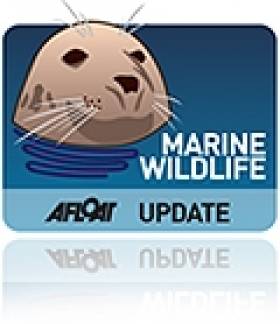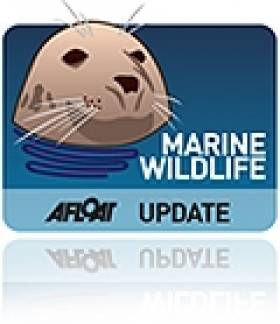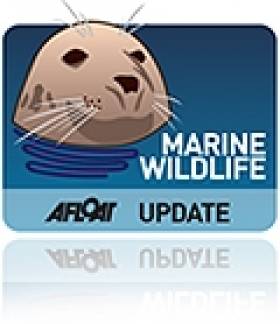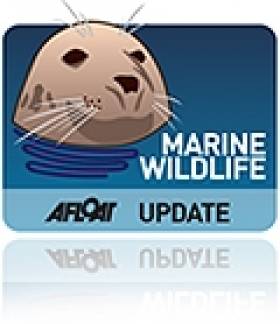Displaying items by tag: carcass
Baltimore Whale Carcass Creating 'Rancid Oil Slick' in Conservation Area
#BALTIMORE WHALE - Nine weeks after the tragic demise of the Baltimore Harbour fin whale, its carcass is still afloat off West Cork, creating a “rancid oil slick” in a special conservation area, according to a local resident.
Tom McCarthy contacted Afloat.ie with the above image of the 65ft whale carcass, which was towed out to the grey seal breeding ground off the Carthys Islands in Roaringwater Bay and has apparently been left to rot.
“It has been left here since the middle of August to decay,” says Tom. “The rancid oil slick is clearly visible and extends for over 1km on relatively still days, the smell is horrendous."
As previously reported on Afloat.ie, plans were afoot to sink the fin whale carcass that was trapped in Baltimore Harbour in mid-August and endured a harrowing few days trapped in Baltimore Harbour before it died from what's presumed to be a combination of illness and injury.
Tom McCarthy claims that the National Parks and Wildlife Service (NPWS) has washed its hands of the situation, considering the enormous marine mammal carcass to be a natural occurrence "even though the animal beached and died several miles [away and] was wrapped in a net and towed to its final resting position".
The location is in a Special Area of Conservation - yet according to Tom, no risk assessment appears to have been carried out beforehand.
"Ten minutes on the internet would show that whales are perhaps the most contaminated animals in the world," he says. "Their blubber is contaminated with persistent organic compounds such as PCBs, DDT, dioxins, etc and the internal organs such as the liver and kidneys are 'high', 'very high' or 'staggeringly high' in mercury, cadmium, chromium, etc.
"Some beached whales are found to be so contaminated the whale itself has to be considered as hazardous waste and disposed of as such."
Tom notes that the area is fished extensively for shrimp, crab, lobster and pollock, and that the rotting carcass is in close proximity to several mussel farms.
"It seems inevitable that as the whale continues to decay and is eaten whatever contaminants were present prior to death will re-enter the food chain."
He compares the current situation to a similar whale carcass disposal in Sligo last year, where the flesh was cut off and sent for incineration while the bones were marked for later skeletal recreation and sent for composting.
Regarding the West Cork whale carcass, Tom says: "Some estimates say it will take three years for the whale to completely decay."
Tom adds that he has been in contact with Cork County Council and hopes to hear on Monday about plans for a more appropriate method of disposal for the whale carcass.
Mystery of Missing 'Narwhal' in Clare is Solved
#MARINE WILDLIFE - The mystery disappearance of an allegedly rare whale carcass from a Co Clare beach last week has been solved.
As The Irish Times reports, Clare County Council admitted yesterday that the "badly decomposed whale" was removed from Liscannor beach "due to public health concerns".
The vanishing of the creature had been a source of puzzlement to the Irish Whale and Dolphin Group (IWDG), after scientists dispatched to examine the carcass found no trace on arrival.
Experts had been hoping to verify whether the carcass was indeed that of a narwhal, an Arctic cetacean renowned for its unicorn-like tusk.It would have been the first recorded sighting of a narwhal in Irish waters.
Max Halliday from Shannon, who reported the find to the IWDG, said he was "convinced that what I saw is a narwhal. It had the long tusk protruding from its head, but its head was badly damaged. I am absolutely mad that I didn't take a photo."
According to the Irish Independent, the IWDG had appealed to those responsible for removing the whale to get in touch so the remains could be transferred to the Natural History Museum.
But it has since emerged that the creature was taken to a rendering plant in Derry by a team contracted by the council.
A spokesperson for Clare County Council said no remains of a tusk were found in the removal operation.
Second Fin Whale Stranding for Sligo
#MARINE WILDLIFE - Sligo County Council is considering its options for disposal after the county's second whale stranding of the winter, when a 60ft male fin whale was beached at Agharrow.
A spokesperson told the Sligo Champion that the whale was in an area known locally as Staid Abbey, lying on a smooth rock ledge that slopes down towards the sea, and is a difficult point to access - particularly in the present stormy conditions.
As previously reported on Afloat.ie, a whale carcass was washed up at the end of last month not far from Agharrow at Raughley. The Irish Whale and Dolphin Group (IWDG) has confirmed that this was the first validated stranding recorded of a fin whale in Co Sligo.
That whale had its flesh removed for fertiliser, while its bones were studied by PhD students from NUI Galway ahead of being buried in a nearby field to allow for the natural decomposition of remaining flesh before future preservation.
Whale Carcass Battered by Strong Sea Gales in Sligo
#MARINE WILDLIFE - The Irish Independent reports on the carcass of a whale that was strewn on a beach in Co Sligo after it was swept into rocks by Monday's gale-force winds.
The 13-metre fin whale had been seen recently on a number of occasions in Lough Hyne, a saltwater lake near Baltimore in Co Cork.
On Monday it was spotted at Raughley in the north of Sligo, where it was found beached by Jimmy and Viera Stupakova after the treacherous conditions of the early part of this week.
The find marks the fifth recorded stranding of the species in Irish waters, and the first validated record of a fin whale in Co Sligo, according to OutdoorCommunity.ie.
It is not yet clear how the juvenile met its end, though initial investigations point to the whale not being long dead.
The Irish Independent has more on the story, including video, HERE.

































































